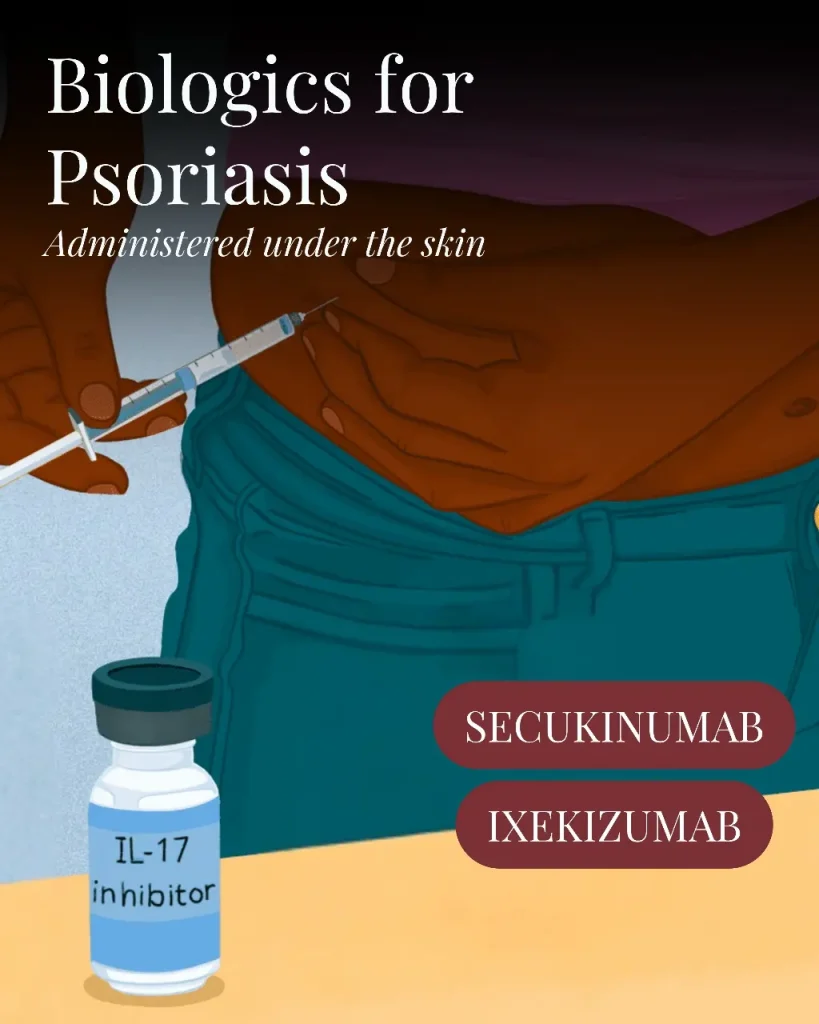Biologics In Psoriasis
New Era of Hope for Psoriasis Patients!
Tired of trying various creams, ointments, lights, and medications, only to see your psoriasis persist or recur? It’s time to consider a new approach: biological therapies. These innovative treatments target the underlying causes of psoriasis, offering a potential game-changer for those seeking lasting relief..

Key Highlights:
- Small molecules like APREMILAST, taken as pills, are new advancements in psoriasis treatments.
- JAK inhibitors like TOFACITINIB, taken as pills, are also found to work best in psoriasis.
- Biologics are safe and effective alternatives to oral steroids.
- Biologics can only be prescribed by a qualified dermatologist.
- Biologics target and inhibit the root cause of psoriasis.
- More effective treatment outcomes and reduced side effects.
- Biologics are administered under the skin.
- SECUKINUMAB and IXEKIZUMAB are advanced biologic treatments for psoriasis.
- ADALIMUMAB, USTEKINUMAB, ETANERCEPT are biologics for severe psoriasis.
- Consulting a dermatologist is crucial to determine the most effective treatment plan, and regular monitoring for side effects and treatment adjustment is required.
Our results speak for themselves






Biologics In Psoriasis at a Glance
- Best Results: For Moderate to Severe Psoriasis
- Treatment Duration: Tailored
- Result Longevity: Permanent in Most Cases
- Back to Daily Activities: Immediately
- Recovery Time: 0 Days
- Blood Investigations: Required
- Performed By: Dermatologist
- Cost: ₹ (Consultation required)
Psoriasis treatment has been revolutionized by the arrival of advanced biologics and small molecule therapies.. At Metaderm, our expert dermatologists are trained to prescribe and monitor biologics, providing personalized care and transformative results for psoriasis patients.
Frequently Asked Questions
Biologics are unique medications derived from living organisms, such as cells or proteins. Unlike traditional drugs, which are chemically synthesized, biologics are designed to specifically target certain processes or components within the body.. They are like special keys that unlock and fix specific issues. They are more complex, more effective, and safer than regular medicines. If your doctor prescribes a biologic, it means they think it's the best option to make you feel better, but it's essential to follow your doctor’s instructions and monitor side effects.
No, biologics are not a cure for psoriasis, but they can significantly improve symptoms and induce remission.
Biologics can help:
- Reduce inflammation and plaque formation
- Slow down skin cell growth
- Improve quality of life
However, biologics may not work for everyone, and individual results may vary. Consult a dermatologist to discuss the best treatment options.
Based on clinical trials and studies, here are some of the most effective biologics for psoriasis:
- Secukinumab: Up to 80% of patients achieve PASI 90 (90% skin clearance)
- Ixekizumab: Up to 83% of patients achieve PASI 90
- Ustekinumab: Up to 66% of patients achieve PASI 90
- Adalimumab: Up to 64% of patients achieve PASI 90
- Apremilast: Up to 73% of patients achieve PASI 90
Note: Efficacy can vary depending on individual patients and disease severity. Speak with a dermatologist to identify the most suitable treatment for your condition.
Here are some signs that a biologic is working for psoriasis:
- Reduced plaque thickness and redness: Skin lesions become thinner, less red, and less scaly.
- Improved skin clearance: More skin areas become clear of psoriasis lesions.
- Decreased itching and pain: Reduced discomfort and itching sensations.
- Slower skin cell growth: Reduced scaling and flaking.
- Improved quality of life: Better sleep, reduced stress, and improved overall well-being.
Timeline:
- 2–4 weeks: Initial improvements in itching, redness, and scaling.
- 8–12 weeks: Noticeable improvements in plaque thickness and skin clearance.
- 16–24 weeks: Maximum response to treatment, with significant improvements in skin clearance and quality of life.
Monitoring:
- Regular follow-ups with your dermatologist.
- PASI (Psoriasis Area and Severity Index) scores to track progress.
- Photography to document skin changes.
Keep in mind that everyone's response to biologics is different, and it may take some time to see improvements.
Biologics, like any other medicine, can have side effects, but not everyone gets them. Consulting a dermatologist is crucial to determine the most effective treatment plan, and regular monitoring for side effects and treatment adjustment is required.

